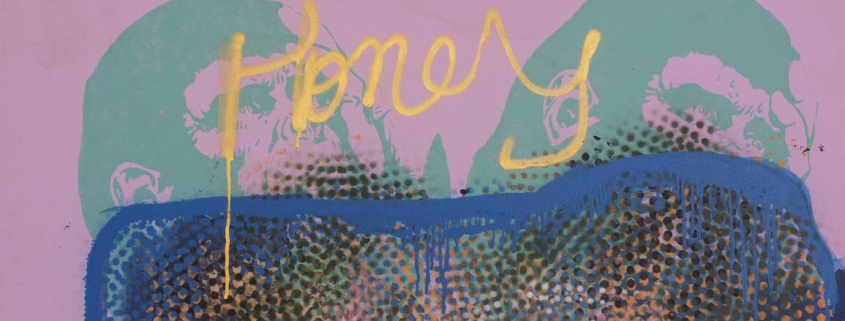PARADYSE OF THE DAMNED
Vusi Beauchamp
Curator: Judy Peter
STATEMENT
Memory and nostalgia have become fraught spaces for audiences to make sense of the contested present. Yet, Beauchamp’s work is not burdened with this sense to unbundle the conflict with a nostalgic consideration of the past, but rather I find his layered multi-media representations grounded in the contemporary. In a spontaneity of layering the complexities and innuendos of the shifting of political alliances in national and global spaces – that is a far cry from the deterministic aspirations of the once utopian ideal of Marxism during the apartheid years.
Post-race, post-black, post-apartheid, were some of the phases I used to position Beauchamp’s earlier work, and in this exhibition titled ‘Paradyse of Damned’ these phrases seemingly resonate more powerfully – another comprehensive compilation of a provocative political reading of contemporary popular culture, post-democracies, and neocolonial liberalism. Beauchamp the artist, multi-media designer, art director, as well as comic artist and an accomplished creative practitioner in an expansive visual and cultural sector. He existentially grapples with the contradictions of the unparalleled rewriting of popular culture and political realities, in the blockbuster movie, Black Panther, the constructed realities of the ideologies of blackness, gendered stereotypes and Darwin’s hierarchies of races, in his artwork titled Borders.
His profile somewhat typifies the younger educated generation of South African artists- who have not been acculturated into indifference when reflecting on the fraught politics of the land or neoliberal manifestations of a rising black petit-bourgeoisie. He remains resolute in his self-imposed desire to respond to contemporary political debate, discourse and regime change. While his works seem to epitomize contestation and disbelief, in 2018- a time of belatedness, in the continuing practices supporting a hierarchy of races and the associated ideas of privilege and entitlement, through his jarring iconographies and his provocative usage of medium and technique, he is consistent in his non-conformist and unlimited visual political commentary and satire.
Although we are in a new political dispensation, Beauchamp contests the dominant ideological values of critical review. Historically, the political discourse regarding genders, race, ethnicities and histories, are embedded within the political landscape. Although new approaches to the writing of history are intended to address omissions and neglected narratives in the colonial historiography, and to open up the discipline to critical debate regarding dominant ideologies, power and knowledge systems, new approaches to history should be liberating, humanizing, creative and critical, create a space for interpretation, debate and contest, as well as be able to sustain an equitable and tolerant society.
This exhibition is intended to debunk and destabilize the iconic successes of popular culture, and interrogate how we measure the success of Black Panther. It is in the midst of continued atrocities leveled at women in Nigeria, the power of social media as an instrument to perpetuate stereotypes defining Eurocentric Africa by its “shithole” status, which are some of the points of bewilderment that underpins Beauchamp’s body of work. Each work is embellished with signifiers to enhance diverse and nuanced readings of South African post-democratic narratives, in broader and vexed places of displacement.

